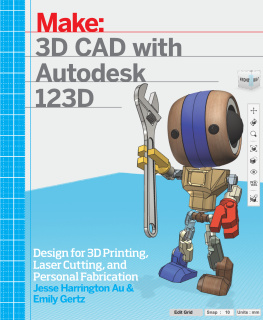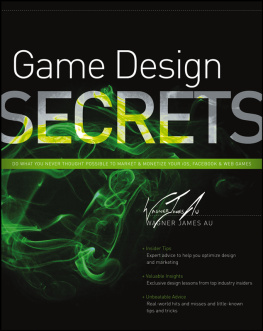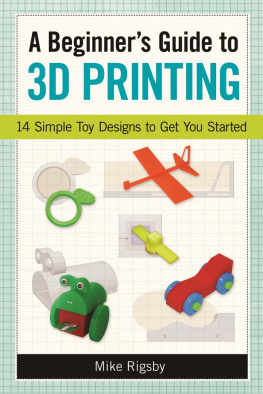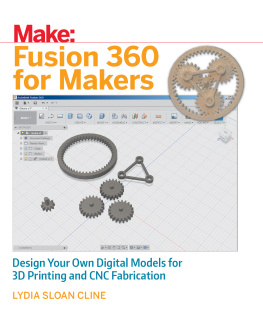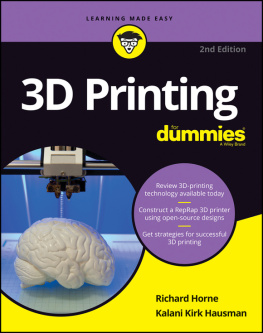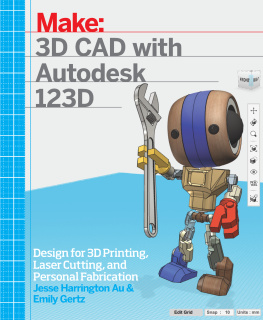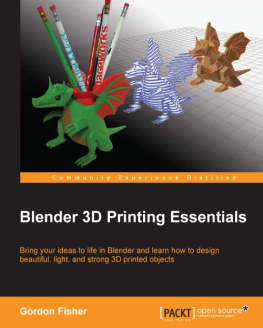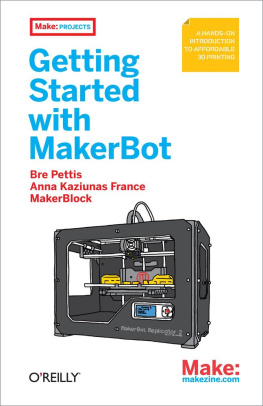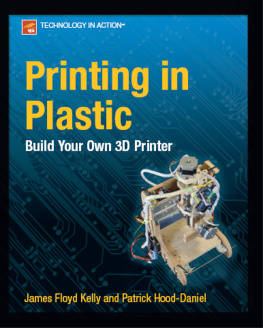3D CAD with Autodesk 123D
by Jesse Harrington Au and Emily Gertz
Copyright 2016 Autodesk, Inc. All rights reserved.
Printed in the United States of America.
Published by Maker Media, Inc. , 1160 Battery Street East, Suite 125, San Francisco, CA 94111.
Maker Media books may be purchased for educational, business, or sales promotional use. Online editions are also available for most titles (http://safaribooksonline.com). For more information, contact OReilly Medias institutional sales department: 800-998-9938 or corporate@oreilly.com.
- Editor: Patrick Di Justo
- Production Editor: Nicholas Adams
- Copyeditor: Jasmine Kwityn
- Proofreader: Charles Roumeliotis
- Indexer: Judith McConville
- Interior Designer: David Futato
- Cover Designer: Brian Jepson
- Illustrator: Rebecca Demarest
- January 2016: First Edition
Revision History for the First Edition
- 2015-12-18: First Release
See http://oreilly.com/catalog/errata.csp?isbn=9781449343019 for release details.
Make:, Maker Shed, and Maker Faire are registered trademarks of Maker Media, Inc. The Maker Media logo is a trademark of Maker Media, Inc. 3D CAD with Autodesk 123D and related trade dress are trademarks of Maker Media, Inc.
Many of the designations used by manufacturers and sellers to distinguish their products are claimed as trademarks. Where those designations appear in this book, and Maker Media, Inc. was aware of a trademark claim, the designations have been printed in caps or initial caps.
While every precaution has been taken in the preparation of this book, the publisher and authors assume no responsibility for errors or omissions, or for damages resulting from the use of the information contained herein.
978-1-449-34301-9
[LSI]
Introduction to the 3D Dimension
We assume you are reading this book because youve arrived at a stage in your creative life where youd like to do more with your computer. You would love to combine its power with advances in computer-aided design (CAD) and fabrication to make something awesome in three dimensions.
Many makers who are accustomed to creating by hand view CAD software suspiciously. They may worry that digital design will lack soul, or be perceived as cheating. Neither is true. A good CAD program can be just that: an aid in realizing your vision for your project.
Just like any other tool, CAD is best viewed as a step on the way to your ultimate goal. You would not build a bench with a hammer as your only tool. So why would you try to design an object using only CAD? In fact, the best way to use a virtual design space involves always keeping an eye on the final step of physical fabrication. If you designed a table to be made from a single sheet of plywood eight-and-a-half-feet long, you might eventually drive yourself insanebecause plywood sheets typically come in eight-foot lengths.
The same goes for transporting an object. We couldnt tell you how many times weve seen someone make an absolutely gorgeous piece of furniture, only to be crushed by the fact that it cant fit through a doorway.
Another important factor in design is sustainability. Making small changes to a designfor example, devising it in such a way that its different parts can all be cut from a single piece of material, or so that it doesnt require expensive fasteners or injection molding techniquescan save you a lot of money as well as the world a lot of wasted material that ends up in a landfill.
The idea for this book came from Jesses daily work with people in a variety of maker spaces, educational facilities both traditional and nontraditional. The makers he met were eager to learn how to design for three dimensions using a computer, but had no idea where to start.
In this book, well talk about putting a hole in an object, rather than the technical term perform a Boolean subtraction. Dont worry, though: you will still come away knowing a bit more of the professional CAD and 3D design terminology, the better to impress the people you tell about your rad projectand even more important, to communicate with fellow designers and fabricators such as yourself.
I (Jesse) began building things at a very young age. I recall my father sitting down with my brother and me, graph paper and a few pencils in hand, and asking us to help design a solar-heated water pump for our pool. Now, keep in mind that I grew up in upstate New York, where it feels as if there is no sun for 10 months out of the year. During the first of the other two months, swimming in that pool was like joining the Polar Bear Club.
I remember my father relating to us the importance of planning in advance for a construction project, especially taking measurements. We would sit for long hours every night, figuring out how much PVC pipe it would take to circulate the water through the heater and warm it efficiently before returning back to the pool. Two factors kept my brother and me attentive during these evenings: the prospect of warmer pool water, which would mean more pool parties; and the highest prize of all, being allowed to use a power saw on the roof of the house.
In the end, the project came together perfectly, resulting in a warm pool and great summers for our remaining years in that house. But what I took away long term was a love for the process, the endless puzzle solving that goes into good design. Will I need a jig to cut certain pieces? How many ways can I smarten up my design so that it will result in an object that is truly all it can be? How should I tweak it to get a final creation that I can ship easily?
These are the sorts of little details that I absolutely love to perfect while toiling away in the world of CAD: the little considerations that Ive learned to inject into a design, after a lifetime of tinkering with poorly made bookshelves or other objects that were made to last a few months at best.
So when you get frustrated with the computer, or you forget to save your file, remember: this is the heart of design. Instead of coping with some other designers bad decisions, now you get to make choices that will result in your object being the most memorable object it can be. When you create somethingwhether it be a 3D print or a handmade chairyou are putting a part of yourself into it. So make sure its something that you can take pride in. Take a little extra time to worry about the radius of the curves or the correct hole sizes. Because if you dont, it just may haunt you for the rest of your life.
Things to Know Before You Get Started
In our experience, many new 3D designers and makers are hard-pressed to find projects that they would like to create. Great ideas come from many places, but if you are struggling to find inspiration, try looking for the gaps or hacks that people come up with to fix objects they use in daily life. Every time we see someone patch something together with duct tape, we cant help but think to ourselves that their situation could have been made easier by better design.
Also, keep an eye out for needs that would be well solved with an object made out of plastic. For example, Jesse remembers helping a college student who was working on generating power from a kite with an attached wind turbine. An easy solution would have been to use electrical tape to attach the turbine. But then, if the project failed, how would he know if the problem was faulty design or faulty tape? A better solution would be a 3D-printed brace or harness for the turbine.
These kinds of scenarios, which come up often for inventors, are when youll be especially glad to minimize the variables by way of sturdily made, 3D-printed parts.

